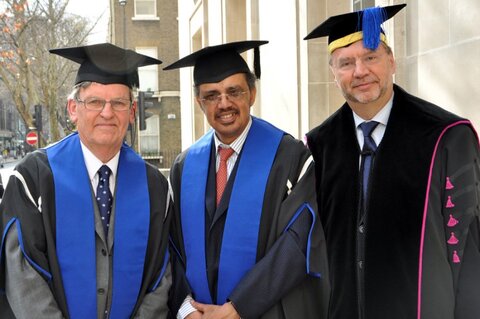LCNTDR members outline the challenges and priorities for WHO's new director general

On 23 May, former LSHTM alumni, Dr Tedros Adhanom Ghebreyesus won the race to become the next director-general of the World Health Organisation.
The LCNTDR asked a selection of its members what the new director-general should prioritise.
Professor Sir Roy Anderson, Imperial College London :
"I am a committed supporter of the WHO. It is an extremely important organization and sets standards for the processes of diagnosis, treatment, prevention and the monitoring and evaluation of country based control programmes for most of the major global health problems.
Within the shifting geo-political and economic landscape one of the major challenges facing the new DG will be to expand and to broaden its funding base beyond the United States and Western Europe and engender support from countries such as China and India.
With the increased frequency of global epidemics such as MERS, ZIKA, and Ebola it is vital that WHO continues to develop procedures for dealing with new epidemics. The response to Ebola showed the importance of good crisis management teams being able to respond effectively to emergencies – and the lessons learnt must be put into practice for future events.
It also identified the need to be better able to speedily evaluate new therapies/vaccines for potential use in such situations. Advances in technology and the use of open access data bases need to be embraced more effectively by the WHO to provide international leadership in both monitoring disease morbidity and mortality.
One of the ambitious challenges the WHO has set is the control and elimination of neglected tropical diseases. The WHO has had great success in working with philanthropists such as Bill and Melinda Gates in developing a road map for this. A clear task is to deliver on this roadmap in the coming decade. These relationships with aid agencies and philanthropists need to be maintained and were possible expanded to face up to many new threats such as that of antibiotic resistance by regulating the use and production of sub-standard or fake medicines.
The WHO needs to be able to call on new ideas and innovations if it is to effectively meet the numerous challenges facing it. To do this the new director may want to institutionalise meritocracy by defining tenure periods for post holders in Geneva and regional offices thereby ensuring a constant flow of new talent."
Dr Wendy Harrison, Schistosomiasis Control Initiative and chair of Neglected Tropical Disease NGO Network
"The WHO has provided outstanding leadership in the fight against neglected tropical diseases. This diverse group of treatable and preventable infectious diseases have a devastating impact on individuals and communities, causing severe disfigurement and disability.
They affect the poorest and most marginalised communities in the world, placing a heavy burden on over one billion people. They impact on life expectancy, education and economic opportunities of affected individuals, costing developing economies billions of dollars each year.
They are cost-effective to treat and are often known as a "best buy in public health", costing as little as half a dollar per treatment. In 2016, the WHO reported on the delivery of almost one billion treatments. We urge the new DG to continue this momentum, to eliminate these diseases that trap communities in poverty and deprive them of the opportunity to fulfil their potential."
Professor David Rollinson, Natural History Museum and Director of the Global Schistosomiasis Alliance
"One key priority would be to unite the global community to increase the momentum to control and eliminate the Neglected Tropical Diseases (NTDs). These debilitating diseases cause unnecessary suffering and hold back the development of poor communities around the world. Much is being done and Guinea Worm is on the brink of eradication. The new Director of WHO has an excellent opportunity to build on this success and ensure that countries, foundations, pharmaceutical companies, reseachers, control programme managers and others rise to the challenge of disease elimination to create a brighter and better future for the "Bottom Billion".";